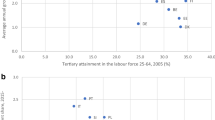Abstract
This paper examines the impact of an academic degree and field of study on short and longterm unemployment across Europe (EU15). Labour Force Survey (LFS) data on over half a million individuals are utilised for that purpose. The harmonized LFS classification of level of education and field of study overcomes past problems of comparability across Europe. The study analyses (1) the effect of an academic degree at a European level, (2) the specific effect of 14 academic subjects and (3) country specific effects. The results indicate that an academic degree is more effective on reducing the likelihood of short-term than long-term unemployment. This general pattern even though it is observed for most of the academic subjects its levels show significant variation across disciplines and countries.
Similar content being viewed by others
Notes
For a full description of the LFS data see European Commission (2007).
That is EU15, including the member countries in the European Union prior to the accession of ten candidate countries on 1st May 2004.
We exclude general programmes from the analysis as the category is rare for graduates (0.7%) and the contents included rather ambiguous.
References
Audretsch, D. B., & Feldman, M. P. (1996). R&D spillovers and the geography of innovation and production. The American Economic Review, 86(3), 630–640.
Bloemen, H. G., & Stancanelly, E. (2001). Individual wealth, reservation wages, and transitions into employment. Journal of Labor Economics, 19(2), 400–439.
Bologna Follow up Group, BFG (2007) Bologna Work Programme 2007–2009. Bologna Follow up Group, Lisbon 2007.
Cardoso, A. R., & Ferreira, P. (2008). The dynamics of job creation and destruction for university graduates: why a rising unemployment rate can be misleading. Applied Economics (i-first).
Crouch, C., Le Gales, P., Triglia, C., & Voelzkow, H. (2001). Local production systems in Europe: Rise or demise?. Oxford, UK: Oxford University Press.
Ehlert, H., & Cordier, H. (2002). The transition from higher education to the labour market. Frankfurt and Main, Germany: Peter Lang gmbH.
European Commission (2007) Labour Force Survey in the EU, Candidate and EFTA Countries. Eurostat Methodologies and Working Papers. ISSN 1977-0375. Luxemburg.
Gangl, M. (2003). The structure of labour market entry in Europe: a typological analysis. In W. Muller & M. Gangl (Eds.), Transitions from education to work in Europe (pp. 107–128). Oxford: Oxford University Press.
Gines, J., Garcia, J., & Garcia, A. (2000). Higher education and graduate employment in Spain. European Journal of Education, 35(2), 229–237.
Heinze, T., & Knill, C. (2008). Analysing the differential impact of the Bologna process: Theoretical considerations on national conditions for international policy convergence. Higher Education, 56, 493–510.
Hulsman, J., & Kaiser, F. (2002). A comparative view on policy trends in western European higher education. German Policy Studies, 1–22.
International Labour Organization. (1996). Population Active Selon La Situation Le Sexe et Le Niveau D’Instruction. Switzerland: Geneve.
Jones, G., Taylor, J., & Ferguson, G. (1987). The employability of new graduates: A study of differences between UK universities. Applied Economics, 19, 695–710.
Kivinen, O., Nurmi, J., & Salminiitty, R. (2000). Higher education and graduate employment in Finland. European Journal of Education, 35(2), 165–177.
Livanos, I. (2009). The relationship between higher education and labour market in Greece: the weakest link? Unpublished mimeo, Institute for Employment Research, University of Warwick.
Lucas, R., & Prescott, E. (1974). Equilibrium search and unemployment. Journal of Economic Theory, 7, 188–209.
Machin, S., & Manning, A. (1998). The causes and consequences of long term unemployment. In Ashenfelter, O. & Card, D. (Eds.), Handbook of Labour Economics. North Holland Editions.
Moreau, M. P., & Leathwood, C. (2006). Graduates’ employment and the discourse of employability: a critical analysis. Journal of Education and Work, 19(4), 305–324.
Moscati, R., & Rostan, M. (2000). Higher education and graduate employment in Italy. European Journal of Education, 35(2), 201–209.
Nickell, S. (1979). Education and lifetime patterns of unemployment. Journal of Political Economy, 87(5), 117–131.
Nickell, S. (1997). Unemployment and labour market rigidities: Europe versus North America. The Journal of Economic Perspectives, 11(3), 55–74.
OECD. (2000). From initial education to working life. Paris: OECD.
OECD. (2006). Jobs strategy: Lessons from a decade’s experience. Paris: OECD.
Paul, J. J., & Murdoch, J. (2000). Higher education and graduate employment in France. European Journal of Education, 35(2), 179–187.
Plumper, T., & Schneider, C. J. (2007). Too much to die, too little to live: Unemployment, higher education policies and university budgets in Germany. Journal of European Public Policy, 14(4), 631–653.
Schomburg, H. (2000). Higher education and graduate employment in Germany. European Journal of Education, 35(2), 189–200.
Schomburg, H., & Teichler, U. (2006). Higher education and graduate employment In Europe: Results from graduates surveys from twelve countries. SpringerLink editions.
Shavit, Y., & Müller, W. (1998). From school to work. A Comparative Study of Educational Qualifications and Occupational Destinations. Oxford, UK: Oxford University Press.
Siebert, H. (1997). Labor market rigidities: At the root of unemployment in Europe. Journal of Economic Perspectives, 11(3), 37–54.
Spence, M. (1973). Job market signalling. Quarterly Journal of Economics, 87(3), 335–374.
Teichler, U. (1999). Higher education policy and the world of work: Changing conditions and challenges. Higher Education Policy, 12, 285–312.
Teichler, U. (2000). Graduate employment and work in selected European countries. European Journal of Education, 35(2), 141–156.
Topel, R. H. (1984). Equilibrium earnings, turnover, and unemployment: New evidence. Journal of Labor Economics, 2(4), 500–522.
UNESCO (2006) International standard classification of education. United Nations Educational. ISBN 92-9189-035-9. Paris, France.
United Nations. (2006). World economic situation, prospects. New York: Department of Economic and Social Affairs, United Nations.
Woodley, A., & Brennan, J. (2000). Higher education and graduate employment in the United Kingdom. European Journal of Education, 35(2), 239–249.
Acknowledgments
Imanol Nuñez acknowledges financial support by the Spanish Ministry of Education and Science under the project SEC2007-67737-C03-02/ECON.
Author information
Authors and Affiliations
Corresponding author
Rights and permissions
About this article
Cite this article
Núñez, I., Livanos, I. Higher education and unemployment in Europe: an analysis of the academic subject and national effects. High Educ 59, 475–487 (2010). https://doi.org/10.1007/s10734-009-9260-7
Received:
Accepted:
Published:
Issue Date:
DOI: https://doi.org/10.1007/s10734-009-9260-7



